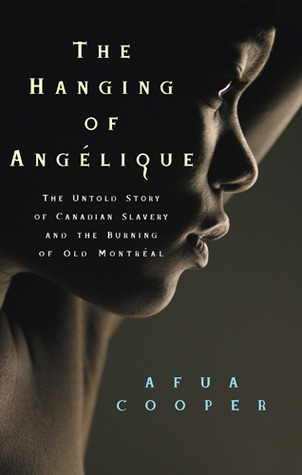Considering HBO’s recent and ill-conceived move in terms of
future television, I thought I would present a brief list of books to read that
will either educate you about slavery that are not objectification. Please keep in mind that I am undoubtedly
missing or forgetting some books simply because my area of interest is not
Civil war. I am trying to highlight
books that are slightly less popular than Roots, the works of Frederick
Douglas, or Uncle Tom’s Cabin.
1.
The Hanging of Angelique by Afua Cooper. This
book is not about American slavery but about slavery in Montreal. Angelique was a slave woman who was accused
and found guilty of setting a fire that destroyed part of the city. The book details slavery in Canada and
illustrates something that people in the United States really don’t know
about. Cooper spent at least 15 years
researching this book, and she expands the topic slightly to deal with slaves
in the colony in general.
2.
Kindred by Octavia Butler. So, you can’t read Sci-fi and not include
Butler’s book on a list like this.
Butler’s heroine finds herself in a time jump, where she is forced
backwards to exist at the same time of her ancestors, including both slaves and
the “owner” who raped them. It is a
stunning and wonderful novel.
3.
 Segu by Maryse Conde. This novel concerns a family in Africa at a
time when both slavery and Islam take hold.
Members of the family responded to the conflicts differently. While most of the book takes place in Africa,
there is a sequence set in the New World that deals with slavery and one members
of the family’s reaction to it. Conde’s
writing is impassioned and her characters live.
There is also a sequel, Children of Segu. Her book I, Tituba is about the slave in the
Salem witch trials and is highly recommend as well.
Segu by Maryse Conde. This novel concerns a family in Africa at a
time when both slavery and Islam take hold.
Members of the family responded to the conflicts differently. While most of the book takes place in Africa,
there is a sequence set in the New World that deals with slavery and one members
of the family’s reaction to it. Conde’s
writing is impassioned and her characters live.
There is also a sequel, Children of Segu. Her book I, Tituba is about the slave in the
Salem witch trials and is highly recommend as well.
4.
The Benjamin January novels by Barbara
Hambly. Hambly’s series is about Ben
January a listened doctor who returns to New Orleans from Paris after the death
of his wife. Ben is a black man, his mother and father were
slaves, and he cannot practice medicine in New Orleans, which is part of the
recent purchase. The series concerns
January solving various crimes while dealing with tensions between Americans
and member of New Orleans, as well as the racism that he is subjected to every
day. His mother (a freed slave) and his
sisters (both free, one a mistress) also play central roles. The book takes a harsh look at slavery as
well as what free blacks dealt with; Hambly even uses real life cases in the
books. Much of the series’ strength
comes from the development of Ben who eventually remarries and resists the
slave owning structure.
5.
The Land Shall be Deluged in Blood by Patrick
Breen. Breen’s book is a history of the
Nat Turner Rebellion. He presents as
much biographical detail about those involved in the Uprising as he can,
examines why there wasn’t more support, and compares it with the events of Haiti.
6.
The Underground Railroad by Coulson
Whithead. In a slim volume that imagines
the Underground Railroad as a truly a railroad, Whithead uses real life
examples of reactions and escapes from slavery to chronicle one woman’s fight
for freedom. The book is quick read and
worthy of all the praise it gets. Every
section has a real-life story that it is based on.
7.
Gateway to Freedom by Eric Foner. Foner’s book is about the Northern areas on
the Underground Railroad. He looks at
the various groups in places lIke Philadelphia who tried to help slaves to freedom. He also highlights the various laws that made
such actions illegal as well as how slave catchers took everyone who was black
regardless.
8.
Confederates in the Attic by Tony Horowitz. This book is less about the Civil War or civility,
but about how certain people cannot get over the Confederacy losing. In other words, Horowitz’s book showcases why
a show such as Confederate is wrong.
Scary reading.
9.
And finally – slave narratives. Today, with the advent of ereaders and Project
Guttenberg, it is quite easy to read slave narratives in addition to 12 Years A
Slave or Narrative of a Life by Frederick Douglass. This is not only due to the copyright free
nature of the works (copyright expired to be more exact) but also Federal
Programs that sent people out to record the narratives. Incidents in the Life of a Slave Girl, Escape
in a Chest, William Brown’s narrative (as well as his fiction story about
Jefferson’s daughter), Noah Davis’ narrative.
You can also read the works of Ida B. Wells, who wrote about lynching as
well as various anti-slavery tracts. All
for free.


Comments
Post a Comment